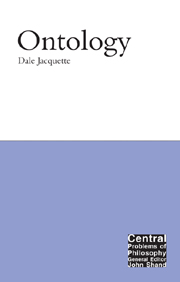Book contents
- Frontmatter
- Contents
- Preface
- Acknowledgements
- Introduction: Being as such
- I Pure philosophical ontology
- 1 What it is to be (on Heidegger)
- 2 Combinatorial ontology
- 3 Why there is something rather than nothing
- 4 Why there is only one logically contingent actual world
- 5 Concepts of existence in philosophical logic and the analysis of being qua being
- II Applied ontology and the metaphysics of science
- Conclusion: scientific–philosophical ontology
- Notes
- Bibliography
- Index
4 - Why there is only one logically contingent actual world
from I - Pure philosophical ontology
- Frontmatter
- Contents
- Preface
- Acknowledgements
- Introduction: Being as such
- I Pure philosophical ontology
- 1 What it is to be (on Heidegger)
- 2 Combinatorial ontology
- 3 Why there is something rather than nothing
- 4 Why there is only one logically contingent actual world
- 5 Concepts of existence in philosophical logic and the analysis of being qua being
- II Applied ontology and the metaphysics of science
- Conclusion: scientific–philosophical ontology
- Notes
- Bibliography
- Index
Summary
Actual existence
It is reassuring to know, in the progress we have made so far, that there must exist something rather than nothing. The two outstanding problems left to be solved in pure philosophical ontology, concerning the uniqueness and logical contingency of the actual world, must also be addressed before we can be said to have satisfactorily answered the question of being.
If we try to answer the question why there exists something rather than nothing combinatorially, by arguing that an actual world must exist, then we leave open at least temporarily the question whether only one actual world exists. We do not commit ourselves thereby to a logical and ontological relation holding between the necessary existence of an actual world and the presumably logically contingent existence of the actual world. Nor have we said enough yet to relate the existence of the actual world and the existence of an actual world by whose necessary existence we answer the question why there exists something rather than nothing. If it is logically combinatorially necessary that all logically possible combinations of all logically possible states of affairs include at least one maximally consistent combination, then it remains at least conceivable that there be more than one maximally consistent combination, of which the actual world that we know through experience might be only one among many distinct actually existent actual worlds. Can we make sense of any of these consequences?
- Type
- Chapter
- Information
- Ontology , pp. 109 - 133Publisher: Acumen PublishingPrint publication year: 2002



